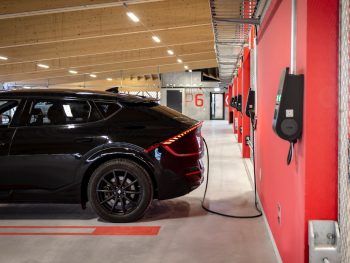Smart messaging will smarten fleet EV charging
By Daniel Forsberg, marketing manager for EVSE at global vehicle charging brand CTEK
Fleet managers are focused on switching to electric vehicles but not yet exploiting the potential cost savings of smart charging, according to a new report.
The UK government-funded study found that better and tailored communication of smart EV charging benefits will help fleets make the most of the technology.
What smart charging is and what it can do are not widely understood by fleet managers and the wider public, the study found. The report – Electric Vehicle Smart Charging: Consumer Research – recommends communicating how smart charging works and its benefits of lower electricity bills.
The research behind the report, carried out by the Energy Saving Trust, examined the current evidence base and interviewed fleet managers who had either started introducing EVs or planned to, plus current and prospective EV drivers. Six focus groups then explored what the best messaging could be.
The EST defines smart charging as charging EVs when electricity demand is lower or when there is more supply than demand. Smart charging can be achieved by pre-setting an EV to charge overnight, for instance, or with the time of charging controlled by an app or by ceding control to the energy provider.
The study found 70-90% of existing EV owners who charge at home already smart charge – mostly by using cheaper overnight charging. Smart charging was much less prevalent at the workplace, with just 12% of EV drivers who charge at work able to schedule their own charging and for a quarter it is the employer who schedules charging.
Fleet managers were found to be struggling to see how smart charging might work and be beneficial for their organisations. They are currently focused on transitioning their fleets to electric and not on optimising how they are charged, said the report.
The report also states that fleet managers’ key needs were efficiency, to avoid wasted time in the charging process, and reliability, so they know their EVs would have enough charge to suffice for a shift. Fleet managers said cost was an important factor, but smart charging is not widely used.

Fleet managers were found to be struggling to see how smart charging might work and be beneficial for their organisations
The report says: “This was due to lack of understanding of how smart charging would work for their fleet, logistical difficulties and concerns that cost savings would not be significant enough to warrant the perceived additional effort.”
A number of fleet managers thought smart charging would not suit their schedules, with EVs not parked for long enough to charge slowly or were only at depots during times of peak grid demand. Some fleet managers whose EV drivers charged at home were reluctant to encourage smart charging.
The report’s conclusion concedes that fleet settings may make smart charging more difficult to put into place, but that fleet managers’ desire to cut costs provides motivation with the added benefit of helping their organisations meet environmental goals or net zero targets.
The report says: “There is a big potential to increase smart charging amongst fleet vehicles, particularly within fleets where vehicles are left for long periods between shifts. Likewise, there may be a potential for company car drivers who charge at home to maximise smart charging behaviour.”
When the researchers asked their focus groups to evaluate smart charging messaging, and each group sought to improve on what their peers had previously refined in earlier meetings, ‘how it works’ was found to be an essential starting point.
Explaining different tariffs was found to help, whilst messages about cost savings were motivational. Communicating the savings from smart charging versus dumb was more effective than not. Combining cost saving and environmental benefits was a ‘win-win’.
The report concludes: “The main misconceptions around smart charging stemmed from lack of understanding of the principles and technology, leading participants to worry about the effort involved and the reliability of smart charging. As such, messages highlighting the ease and convenience were well received.”
This research highlights both a challenge and an opportunity for the EV ecosystem, including smart-enabled charge point manufacturers such as CTEK. By effectively communicating how smart charging works and its tangible benefits, we can help fleet managers make informed decisions that drive cost savings and efficiency.
I recommend charge point manufacturers, charge point operators, installers, energy suppliers and everyone else in the EV world reads this important study.


